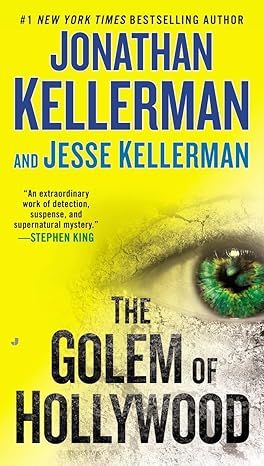The Golem of Hollywood (A Detective Jacob Lev Novel)
3.3
-
2,513 ratings
The #1 New York Times bestselling author of the acclaimed Alex Delaware novels and the award-winning #1 international bestselling author of The Genius combine their extraordinary talents for one of the most unusual—and unnerving—thrillers of the year.
Detective Jacob Lev has awakened dazed and confused: it appears he picked up a woman the night before, but can’t remember anything about it. And then suddenly, she’s gone. Not long after, he’s dispatched to a murder scene in a house in the Hollywood hills. There is no body, only a head. And seared into a kitchen counter is a message: the Hebrew word for justice.
Lev is about to embark on an odyssey—through Los Angeles, London, and Prague, through the labyrinthine mysteries of a grotesque ancient legend, and most of all, through himself. All that he has believed to be true will be upended. And not only his world, but the world itself, will be changed.
Kindle
$9.99
Available instantly
Audiobook
$0.00
with membership trial
Hardcover
$2.00
Paperback
$9.99
Ships from
Amazon.com
Payment
Secure transaction
ISBN-10
0425276139
ISBN-13
978-0425276136
Print length
688 pages
Language
English
Publisher
Berkley
Publication date
July 27, 2015
Dimensions
4.31 x 1.41 x 7.56 inches
Item weight
12.5 ounces
Product details
ASIN :
B00KRPQ2L4
File size :
4291 KB
Text-to-speech :
Enabled
Screen reader :
Supported
Enhanced typesetting :
Enabled
X-Ray :
Enabled
Word wise :
Enabled
Editorial reviews
Praise for The Golem of Hollywood
“An extraordinary work of detection, suspense, and supernatural mystery. I spent three days totally lost in the world Jonathan and Jesse Kellerman have created. This is brilliant, page-turning fiction with mythic underpinnings that give it a special resonance; a rare collaboration where the sum is truly greater than the parts. The book is like nothing I’ve ever read before. It sort of took my breath away.”—Stephen King
“One of the many things I enjoy about anticipating something is having my expectations met and exceeded…the Kellermans met my expectations and blew the roof off of them. The Golem of Hollywood transcends genre. It’s a whole that exceeds the sum of its very considerable parts, creative and otherwise. It’s a religious tale that doubters and non-believers will love, a mystery that literary snobs will appreciate, and a story so wonderfully told that your bookshelf must have it. Once you finish reading it, of course.”—BookReporter.com
“Two masters of psychological suspense weave a sprawling contemporary whodunit steeped in religious mythology, gruesome violence, and the supernatural…this is a witty, propulsive and frequently chilling read; its phantasmagorical elements are blended seamlessly enough with its up-to-the-minute crime-genre trappings to give its imaginative speculations some eerie plausibility. Any mystery that leaves you as satisfied with its lingering questions as it does with its solutions is worth your patronage.”—Kirkus Reviews (starred review)
“Combining the procedural structure of Jonathan Kellerman’s Alex Delaware novels with the character-driven plotting of son Jesse’s fiction, the novel is a solidly plotted thriller that takes its compelling lead character, Detective Lev, deep into some Old World mysteries. Very nicely done.”—Booklist
“Astonishing…more complex and deeper book than I have read from either author.”—ReadMeDeadly.com
Read more
Sample
CHAPTER ONE
PRAGUE, CZECH REPUBLIC
SPRING 2011
Heap had followed the girl for days.
The watch was an important part of it, the most delicious part: sinking into the background while that wonderful brain of his roared in high gear, eyes, ears, everything finely tuned.
People tended to underestimate him. They always had. At Eton: two nights locked in a broom closet. At Oxford, they laughed, they did, the horsefaced girls and the cooing boys. And dear Papa, Lord of the Manor, Chancellor of the Purse Strings. All that school and you a bloody office boy.
But underestimated is close to unnoticed.
Heap capitalized on that.
She could be any girl who struck his fancy.
Eye the herd.
Cull.
The bright-eyed brunette in Brussels.
Her virtual twin in Barcelona.
The early work, glorious countryside afternoons, honing his technique.
The unmistakable tingle came on him like a fit of sick. Though Heap wasn’t fool enough to deny that he preferred a certain species: dark hair, sharp features. Lower class, not too bright, not bad-looking but well shy of pretty.
Smallish body, except he demanded a big chest. The soft, yielding pressure never failed to excite.
This one was perfect.
—
HE HAD FIRST SPOTTED her walking east along the Charles Bridge. He’d been skulking round for two weeks by then, taking in the sights, waiting for an opportunity to present itself. He liked Prague. He’d visited before and never left disappointed.
Among the jean-clad magpies, the wattled American tourists, the leather-voiced buskers, and the minimally talented portrait artists, she had stood out for her modesty. Limp skirt, tight hair, focused and grim, she hurried along, cheeks carved out by the midmorning glare off the Vltava.
Perfect.
He tried to follow her but she melted into the crowd. The next day, he returned, hopeful, prepared, attentive. Opening his guidebook, he pretended to reread a gray box headed Did you know? The bridge had eggs mixed into its concrete for added strength. Good King Charles IV had commandeered every last egg in the kingdom, and they had obeyed, the stupid, slobbering masses, showing up to place them obsequiously at his royal feet.
Did Heap know?
Yes, he did. He knew everything worth knowing and much besides.
Even the guidebook underestimated him.
She passed again at the same time. And the day after that. Three days running he watched her. A girl of fixed habits. Lovely.
Her first stop was a café near the bridge. She donned a red apron, cleared tables for change. At dusk, she left Old Town for New Town, exchanged the red apron for a black one, bussing trays and refilling steins at a beer hall that, by the smell of it, catered to the locals. Photos of the entrées in the window showed sausages smothered in that vile, muddy sauce they put on everything.
From beneath the trolley stand, Heap watched her flit here and there. Twice passersby paused to ask him a question in Czech, which Heap took to mean that he appeared, as ever, unremarkable. He replied, in French, that he spoke no Czech.
At midnight, the girl finished mopping up. She doused the restaurant’s lights, and a few minutes later, a window two floors up blinked yellow, and her pale arm drew the blind.
It would be a squalid rented room, then. A sad and hopeless life.
Delicious.
He considered finding a way into her flat. Blitzing her in her own bedroom.
Appealing notion. But Heap despised senseless risk. It came of watching Papa burn thousands on football, cricket, anything involving imbeciles and a ball, pouring the fortune of centuries down the grimy throats of bookmakers. Never the most discriminating chap, Papa. How he loved to remind Heap that it would all be gone before Heap saw a penny. Heap was nothing like him and therefore deserved nothing.
Someday Heap would let him know what he thought of that.
To the task at hand: no sense changing the pattern. The pattern worked. He’d take her on the street like the others.
Leaving an empty-eyed shell propped against a dustbin or a wall, waiting to be discovered by some privileged citizen of the free world.
Heap examined an unmarked door to the right of the restaurant, six anonymous buzzer pushes. Never mind her name. He preferred to think of them numerically. Easier to catalog. He had the librarian’s spirit in him, he did. She would be number nine.
—
ON THE SEVENTH NIGHT, a Thursday, Number Nine went up to her room as usual but reemerged soon after, a feather duster in one hand, a folded square of white cloth in the other.
He gave her slack, then followed north as she crossed into Old Town Square, uncomfortably alive with pedestrians. He clung to shadows on Maiselova as they entered Josefov, the former Jewish quarter.
He had come this way days before, while reacquainting himself with the city. It was the thing to do, see the old Jewish places. Dutifully he had elbowed through the revolting gawking swarms, tour guides prattling about Slavic tolerance while their charges snap snap snapped away. Heap didn’t care enough about Jews as a group to summon genuine loathing. He regarded them with the same contempt he had for all lesser humanity, which included everyone except himself and a select few. Those Jews he’d known at school were self-satisfied twits laboring to be more Christian than the Christians.
The girl turned right at a shambling yellow wreck of a building. The Old-New Synagogue. Curious name to go along with a curious design. Part Gothic, part Renaissance, the result a rather clumsy porridge, homely crenellated roof and skimpy windows. Far more old than new. But then Prague had no end of old buildings. They were common as streetwalkers. He’d drunk his fill.
An alleyway unfurled along the synagogue’s south side, ending at a wide set of ten steps that in turn ran up to the shuttered shops of Street. Heap wondered if Nine was headed there, to tidy up at one of the boutiques.
Instead she went left at the foot of the steps, disappearing behind the synagogue. Heap crept along the alley in crepe-soled shoes, reaching the steps and stealing a glance.
She stood on a small cobbled terrace, facing the rear of the synagogue, into which was set an arched iron door, rudely studded. A trio of rubbish bins constituted the exterior decor. She had flapped open the white cloth and was tying it around her waist: yet another apron. Heap smiled to imagine her closet, nothing but aprons in every color. So many secret identities she had, each more wretched than the last.
She picked up the feather duster from where she’d laid it, against the wall. She shook it out. Shook her head, as well, as if banishing drowsiness.
Industrious little charwoman. Two full-time jobs and now this.
Who said the work ethic was dead?
He might have taken her right then, but a duet of drunken laughter came bounding along , and Heap continued slowly up the steps, watching the girl peripherally.
She withdrew a key from her jeans and let herself into the synagogue through the iron door. The lock clanked.
He took up a vigil beneath a lamppost, opposite the synagogue’s dark visage. A series of metal rungs in the brick ran up to a second arched door, a shabby wooden echo of the iron one, thirty-five feet off the ground and opening illogically onto thin air.
The garret. Did you know? There, the world-famous (according to whom, Heap wondered) Rabbi Loew had conjured the golem, a mythical mud-creature who roamed the ghetto, protecting its inhabitants. The selfsame rabbi had a statue of himself in a grand square, he did. While following the girl, Heap had pretended to stop and take its picture.
Hideously undignified, really. Mud was one step above shit.
The legend had become the wellspring of a gaudy commercialism, the monster’s lumpy form cropping up on signs and menus, mugs and pennants. In one particularly rank bistro near Heap’s hotel you could buy a brown-sauce-soaked Golem Burger and wash it down with Golemtinis enough to rot your liver.
People would pay for anything.
People were disgusting.
The laughter of the couple had faded in the warm wind.
Heap decided to give it one more night. More foreplay made for a better climax.
—
FRIDAY EVENING, the Old-New was a busy place, worshippers filing in, some stopping to talk to a blond man stationed out front with a walkie-talkie. With smiles all around, and everyone afforded entry, the attempt at security struck Heap as a bit of a sham.
Nevertheless he’d come prepared, his better suit (his only decent suit since Papa had screwed tight the tap), a mild white shirt, and his old school tie, plus inoffensive flat-lensed specs. Approaching the entrance, he hunched to take off some height, blousing his jacket, eliminating the bulge of his inside pocket.
The blond guard was more of a boy, hardly out of nappies. He shifted his body to block Heap’s progress, addressing him in a throaty, vulgar accent. “Can I help you?”
“I’m here to pray,” Heap said.
“Pray,” the guard said, as if that were the strangest reason to visit a house of worship.
“You know. Give thanks. Praise God.” Heap smiled. “Perhaps it’ll help.”
“Help?”
“World a mess and all that.”
The guard studied him. “You want to come into the shul?”
Dense little turd. “Indeed.”
“To pray for the world.”
Heap lowered the level a few notches. “That and personal good fortune, mate.”
“You are Jewish?”
“I’m here, am I not?”
The guard smiled. “Please, you can tell me: what is the last holiday?”
“Sorry?”
“The most recent Jewish holiday.”
A furious moment while Heap ransacked the files. A light sweat broke out on his forehead. He resisted the urge to wipe it away. Aware that he was taking an awfully long time, he coughed up what he had. “Well, then, that would be Passover, would it not?”
The guard said, “Passover.”
“Reckon so, yes.”
The guard said, “You are British.”
There’s a clever lad. Heap nodded.
“I can see your passport, please?”
“One wouldn’t think one would need it to pray.”
The guard made a show of taking out his keys and locking the synagogue door. He gave Heap a condescending pat on the shoulder. “Wait here, please.”
He sauntered off down the street, murmuring into his walkie-talkie while Heap swam in the red tide of his mind. The sheer nerve: to touch him. He puffed his chest against the bulge. Stag bone handle. Six-inch blade. Ought to give thanks of your own, mate.
Twenty yards hence, the guard stopped at a doorway. A second man materialized and the two of them conferred, appraising him openly. The sweat kept oozing. Sometimes the sweat was a problem. A drop ran in Heap’s eye and stung and he blinked it away. He knew when he wasn’t wanted. He could be patient. He left the guards talking and went on his way.
—
EVERY MAN HAS HIS LIMITS, though. After six more days without a fair chance, he was aroused to the brink of madness, and he decided that tonight would be the night, come what may, and how lovely it would be.
By three a.m., she’d been inside the synagogue for over two hours. Heap slouched in darkness near the steps, listening to distant bleats from somewhere well beyond the Jewish quarter, rolling the knife handle between his fingers. He began to wonder if she’d snuck in a brief nap. Busy girl, she must be falling off her feet.
The iron door screamed on its hinges.
Number Nine stepped out toting a sizable plastic tub. She turned her back to him, headed for the rubbish bins, hoisted the tub and dumped it out noisily, clanking cans and rushing paper, and he unfolded the blade (oiled and silent, a welcome release it was, like his lungs filling with fresh air) and moved on her.
Halfway to her, a muffled clap froze him in panic.
He glanced back.
The alley was empty.
As for the girl, she hadn’t noticed the noise; she continued about her business, raking out the last of the rubbish with her fingers.
She set the tub down.
She untied her hair and began to regather it, and her raised arms formed a wide-hipped lyre, oh lovely lovely shape, and his blood boiled afresh and he started forward again. Too eager: his shoe caught the cobblestone and sent a pebble clicking toward her and she went rigid and turned, her mouth already poised to scream.
She didn’t have time enough before his hand mashed against her lips and he twirled her, her back to his belly and his stiffening prick. Practical hardworking girl, she kept her nails cut short; hard rounded calluses clawed ineffectually at his arms and face before a deeper prey instinct took hold of her and she sought his instep to stomp it.
He was ready. Number Four, Edinburgh, had done the same. A sharp little heel; a broken metatarsal; a good pair of loafers, ruined. Heap had learned his lesson. He had his feet splayed as he braced against her. He twined his fingers in her hair and yanked her head back to form a graceful convexity of her gullet.
He reached up to stroke the blade.
But she was a resourceful lass, and it seemed she must have fingernails after all, because she made a spittly hiss and he felt a hideous stab in his eye, like an awl driving through the lens and the jelly to scrape his optic nerve. False colors gushed. The pain made him gag and loosen his grip on her hair and his hand went up to protect his face. He had prey instincts, too.
Her distorted form broke away from him and ran for the steps.
Groaning, he lurched forth, grabbing at her.
Another hiss; another stab of pain, his other eye, driving him stumbling into the rubbish bins, both eyes streaming, the knife flung from his hands. He could not understand. Had she shot him? Thrown something at him? He blinked forcefully to clear the blurriness and he saw the girl reaching the top of the steps, disappearing round the corner onto , and her waning form brought the awareness of a dawning catastrophe.
She had seen his face.
He struggled to his feet and started after her, and from behind he heard a hiss and pain knocked him flat, as if someone had buried a claw hammer in the base of his skull, and as he pitched against the hard ground, his fine roaring brain grasped that something was happening to him, something wrong, because the girl was long gone.
Sprawled on his stomach in scattered rubbish, he opened his tearing eyes and saw it, half a foot away, a coin-sized spot, glittering blackly on the cobblestones.
A hard-domed insect, shimmering antennae, long black thorn sprouting from its head.
It charged him, driving itself into the center of Heap’s forehead.
He screamed and swatted at it and tried to stand up, but the thing kept coming at him, fast and vicious, the growl of its wings audible in every direction, like a cattle prod touched to Heap’s neck, his spine, the backs of his knees, herding him away from the steps and backing him into the wall of the synagogue, where he balled up with his arms thrown over his head.
Abruptly, the assault broke off, and the night went still save a faint wooden clapping noise. Heap waited, shaking. Puncture wounds seeped along his hairline, blood trickling along the side of his nose and into his mouth.
He uncovered his head.
Down on the cobblestones, the bug squatted, peering up at him.
Full of hate, Heap rose to his full height.
Raised his foot to crush it to pulp.
Brought his foot down.
Missed.
It had dodged and was waiting, several inches to the right.
He tried again, and again it moved, and again, and they engaged in an absurd little wrathful dance, Heap stamping and jerking while the foul creature darted in mocking circles.
At last he came to his senses. He was chasing an insect, and meanwhile the girl who had seen his face was God knows where, saying God knows what to God knows whom.
He had to leave. Now. Never mind his things. Catch a taxi straight to the airport and depart posthaste for jolly old, never to return to this awful place.
He turned and ran and crashed into a wall.
A wall that hadn’t been there before.
A wall of mud.
Broad as an avenue, taller than the synagogue, soaring upward like some manic cancer, climbing, expanding, ballooning, reeking of stagnant waters, rotting fish, mold, oily reeds.
He slipped and fled in the opposite direction, hitting another wall.
And then it surrounded him, the mud, mud walls, a city of mud, a megalopolis, vast and dense and formless. He raised his gaze to an indifferent sky, the stars blotted out by mud. Weeping, he cast his eyes down to the earth, where mud black as dried blood began to creep across his shoes, starting at the toes and inching upward. He screamed. He tried to lift his feet and found his shoes cemented to the stones; tried to kick them off but the mud had reached his ankles and grasped his shins and begun to climb. It was the source of the smell, viscous and putrid. It was an absence of color and an absence of space, an aggressive burning emptiness swallowing him alive.
He screamed and screamed and his voice came back close and wet and dead.
The blackness rose to his knees, grinding his bones in their joints; it moved up his thighs like too-tight stockings rolled incrementally up, and Heap’s bowels opened of their own accord, and he felt his genitals pressed, slowly, back up into his body cavity; he felt his abdomen cinched and his ribs snapped and his windpipe collapsing and his innards forced up into his neck, and he ceased to scream because he could no longer draw breath.
In the wall of mud, two slits yawned, a pair of cherry-red holes at eye level.
Studying him. As he had once studied his own prey.
Heap could not speak, but he could move his lips.
He mouthed, “No.”
The answer came: a weary sigh.
Muddy fingers closed around him and squeezed.
As Heap’s skull popped free of its spinal moorings, millions of neurons made their final salvo, and he experienced several sensations at once.
There was, of course, pain, and beyond that, the agony of insight. His was a death without benefit of ignorance, for he understood that he understood nothing, that his sins had not gone unnoticed, and that something unspeakable waited for him on the other side.
Finally there were the fugitive images that imprinted themselves on his fizzling, fading brain as his gape-mouthed head spun in the air: a night sky flocked with gentle clouds; the saffron glow of the lamps along the riverbank; the door to the synagogue garret, flapping open in the breeze.
Read more
About the authors
Jonathan Kellerman
Jonathan Kellerman is the #1 New York Times bestselling author of more than three dozen bestselling crime novels, including the Alex Delaware series, The Butcher’s Theater, Billy Straight, The Conspiracy Club, Twisted, True Detectives, and The Murderer’s Daughter. With his wife, bestselling novelist Faye Kellerman, he co-authored Double Homicide and Capital Crimes. With his son, bestselling novelist Jesse Kellerman, he co-authored The Golem of Hollywood and The Golem of Paris. He is also the author of two children’s books and numerous nonfiction works, including Savage Spawn: Reflections on Violent Children and With Strings Attached: The Art and Beauty of Vintage Guitars. He has won the Goldwyn, Edgar, and Anthony awards and has been nominated for a Shamus Award. Jonathan and Faye Kellerman live in California, New Mexico, and New York.
Read more
Reviews
Customer reviews
3.3 out of 5
2,513 global ratings
ShaniAZ
5
Extraordinary! A warning against mediocre assumptions about life
Reviewed in the United States on February 21, 2017
Verified Purchase
I love magical realism, so this book is "right up my alley", so to speak. The low reviews here make me sad, but I suppose they are written by readers who wanted an LA Whodunnit, rather than an exploration of dimensions of and purity of the soul. This is no ordinary "murder mystery". Fans of Dara Horn (The World to Come) will enjoy this book immensely, as I did. I loved the symbolic "clues" left throughout the book.
This story is a beautiful, intriguing exploration of the concept of Gilgul, the wheel-like cycle of souls. It is so much fun, and so fulfilling to read a fiction bestseller that dares to play with the assumptions we make about life!
SPOILER ALERT (a few details that felt like hints to me ): I was drawn in immediately by Asham, whose name is the ritual sacrifice made for accidental/unpremeditated transgressions. Asham/אשם = Guilty. (Her name foretold her fate, but the narrative makes it clear that it is she alone who sealed it.) I grew suspicious the instant Jacob read his mother's gravestone and her Hebrew name was פרל, "Pearl/Perel". I don't know why, but I knew it was significant...names being what they are. The beetle/cockroach is a wonderful nod to Kafka, but much more powerfully, a symbol of the Judahite Monarchy. I love the use of the number 36, including Lev's name,(the protagonist family's American surname LeV; לב; 36, Lamed Vav). I loved the use of 613, and so many.numbers and symbols that inspire me to contemplate possibilities on what we are, and why we are: Gan Eden, Olam HaZeh vs. Olam haBa; Gehinom...FASCINATING!
Golem of Paris, here I come.
Read more
13 people found this helpful
Paper or Kindle
5
Terrific concept and execution
Reviewed in the United States on July 1, 2017
Verified Purchase
Perhaps there's a bit too much thrown into this mix, but I loved it. It's a combination of genres, so if you're expecting to read a mystery, police procedural, fantasy, historical novel, reincarnation or even a love story, you may be disconcerted by the combination of all these elements. If you are not Jewish or have no knowledge of Eastern European Judaism, you may be bored. I think this book would appeal mostly to Jews of Eastern European descent who know a lot of the folk tales and religious rituals (whether they practice them or not). The Golem of the title is a sort of Frankenstein, made of mud by a rabbi who lived in a ghetto hundreds of years ago. His intention was to protect the inhabitants of his town. But the authors give far more of a backstory to the creature, going all the way back to Adam and Eve, and a follow-up which moves into the present day. In the present: an alcoholic detective who battles depression and has fallen from his Jewish roots is assigned to a covert unit and told to investigate a bizarre murder. He encounters a very mysterious woman and an assortment of enigmatic coworkers, reunites somewhat with his father, a devout Jew who is regarded as practically a saint, and learns some shocking, almost unbelievable, things about himself and his family. There's a sequel, which I'm eager to read. I think this is a terrific book, but intended for a narrow audience.
Read more
10 people found this helpful
Creepy Cat Lady
4
Great book!!!
Reviewed in the United States on January 21, 2017
Verified Purchase
I thought this book was fabulous. I had read THE GOLEM OF PRAGUE first and was unclear about some points. However this book, which I should have read first, cleared up most of them. I didn't find it at all confusing, I loved the way he interspersed the story of Mia in between the story of the hunt for the serial killers. The only criticisms I might have would be that I never got a complete picture of who the tall cops were, were they half angels? Also I don't know why they wanted to kill Mia. The inner story didn't tell why the Maharal was "given permission" to create the golem and why he had to give him up. I am gathering that the golem's soul was for penance for what she did at Tower of Babel. Also I am unclear about Sam Lev's true roll, other than the obvious one of being the main character's father. In the story he knew the tall cops, but it never explained why. Was he the reincarnat of the Maharal? And was Bina the reincarnat of the Maharal's wife? And then there is the question of why Mia was obsessed with the main character? What drew her to him? The explanation about the beetle explained the obsession but not the initial attraction. I missed that answers somehow. However, despite these lingering questions, which might be my failing, I loved both of the Golem books and I hope Kellerman writes more in that series. I will definitely follow them and maybe along the way, get the answeres to my questions.
l cops
Read more
3 people found this helpful
William S.
4
Golem Introduces Conflicted Detective
Reviewed in the United States on December 31, 2019
Verified Purchase
The book went back and forth between ancient history and the present and was a little confusing. I was able to get the connection at the end, so all's well that ends well. Or does it. The ending tied up the story too neatly yet left too many holes, which will probably be explored in the sequel.
Reid W. Coleman
4
Addresses but doesn't answer questions I have always had, and adds another
Reviewed in the United States on October 5, 2018
Verified Purchase
first let me say that any book that I read in two sittings that causes me to do hours more research can't be bad. From my earliest Bible studies I have wondered...who or what are the nephilim and are they the sames as the "sons of god" and if not what are they? Next, although man-made life myths are not uncommon, why do they figure so much in Jewish mysticism? Fourth, what of the daughters of Adam and Eve? This book, wrapped around a decent who-dunnit, gives direction but no certainty to these questions. A new question is created: if the nephalim were responsible for the saving of the spirit of Asham and she became the animus of the golem, why were the nephalim dedicated to its destruction? And the next book never answers how the golem was captured in the jar. Ah, well. A book that makes me think this much and work this hard can't be bad.
Read more
3 people found this helpful
Top Jonathan Kellerman titles
View all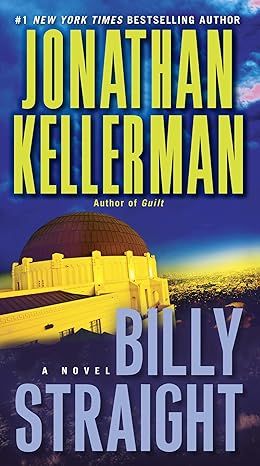
Billy Straight
4.6
-
1,766
$0.50
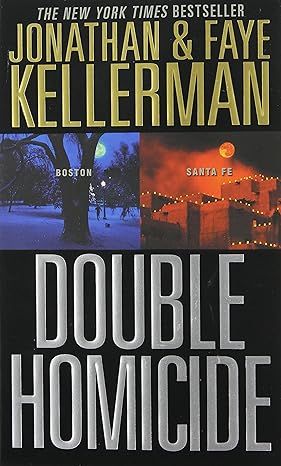
Double Homicide
4.1
-
1,297
$1.82
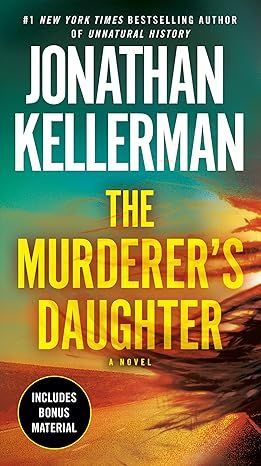
The Murderer's Daughter: A Novel
3.9
-
6,872
$1.74
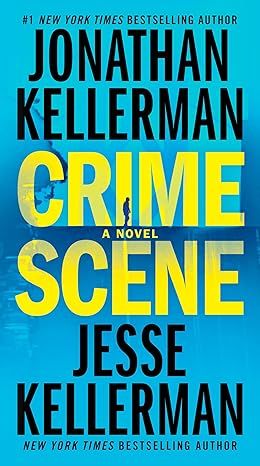
Crime Scene: A Novel (Clay Edison)
4.1
-
5,842
$9.99

When the Bough Breaks (Alex Delaware series, Book 1): A tensely suspenseful psychological crime novel
4.3
-
4,786
$9.99

The Lost Coast: A Novel (Clay Edison)
4.4
-
802
$14.99

The Ghost Orchid: An Alex Delaware Novel
4.5
-
9,470
$2.99
Similar Books
Best Sellers
View all
The Tuscan Child
4.2
-
100,022
$8.39

The Thursday Murder Club: A Novel (A Thursday Murder Club Mystery)
4.3
-
155,575
$6.33

Sapiens: A Brief History of Humankind
4.6
-
140,302
$13.49

The Butterfly Garden (The Collector, 1)
4.3
-
88,556
$9.59

Things We Hide from the Light (Knockemout Series, 2)
4.4
-
94,890
$11.66

The Last Thing He Told Me: A Novel
4.3
-
154,085
$2.99

The Perfect Marriage: A Completely Gripping Psychological Suspense
4.3
-
143,196
$9.47

The Coworker
4.1
-
80,003
$13.48

First Lie Wins: A Novel (Random House Large Print)
4.3
-
54,062
$14.99

Mile High (Windy City Series Book 1)
4.4
-
59,745
$16.19

Layla
4.2
-
107,613
$8.99

The Locked Door
4.4
-
94,673
$8.53
